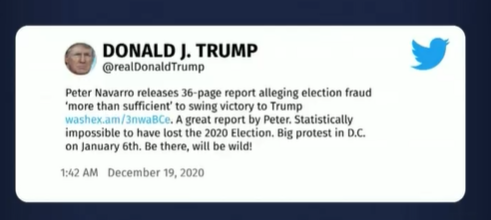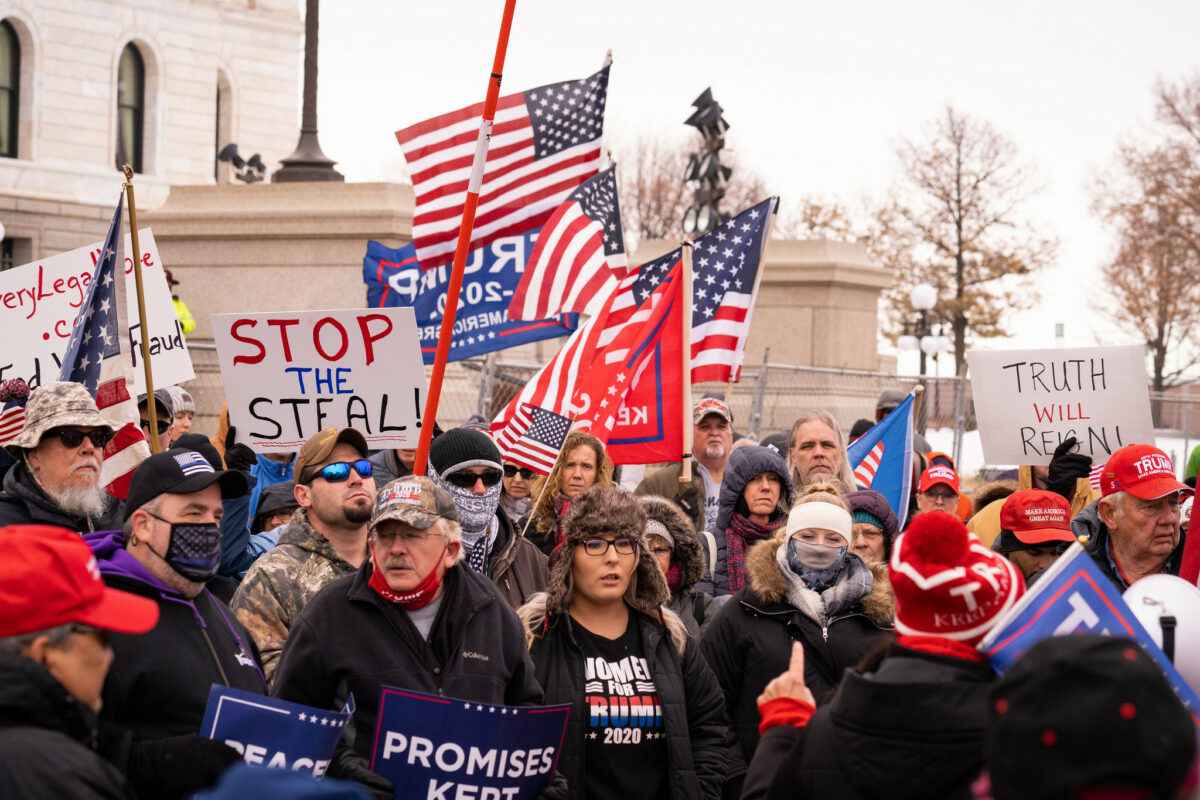The House select committee investigating the Jan. 6 attack on the U.S. Capitol held its seventh day of hearings Tuesday with a dual focus: an “unhinged” Dec. 18, 2020, White House meeting between former President Donald Trump and conspiracy theorists, and the role of extremist groups like Proud Boys and Oath Keepers.
Key to the committee’s hearing was the testimony of Pat Cipollone, Trump’s White House counsel, who did not agree to testify until earlier this month. Cipollone’s testimony, which was recorded and aired during the hearing, confirmed previous testimony by Mark Meadows aide Cassidy Hutchinson and others and shed light on that Dec. 18 meeting.
Reps. Jamie Raskin and Stephanie Murphy led the presentation and questioning of two witnesses: Jason Van Tatenhove, a former Oath Keepers propagandist, and Stephen Ayres, an insurrectionist who said he came to D.C. on Jan. 6 because Trump asked him to.
Here are five takeaways from the hearing.
Trump wanted to name conspiracy theorist Sidney Powell a special counsel and may have informally done so.
On Dec. 18, 2020, three election conspiracy theorists were let into the White House by a junior staffer for an unsupervised audience with the president. Fifteen minutes passed before Cipollone walked into the room and, much to his displeasure, saw Trump team lawyer Sidney Powell, former national security adviser Michael Flynn, and former Overstock CEO Patrick Byrne—all of whom were associated with the so-called “Stop the Steal” movement and the far-right QAnon conspiracy movement.
Making wild claims of voter fraud, the conspiracy theorists, who were joined by Rudy Giuliani, advocated that Trump appoint a special counsel to seize voting machines and use the full weight of the Trump administration to charge people with crimes relating to alleged election fraud. On the other side, Cipollone, Trump’s White House counsel Eric Herschmann, and former White House staff secretary Derek Lyons asked for evidence of such wild claims and pointed out the absurdity of such a proposal.
Lyons confirmed reporting by Axios that Trump had told Cipollone and his team something to the effect of: “You guys are offering me nothing. These guys are at least offering me a chance. They’re saying they have the evidence. Why not try this?”
Trump then asked if he had the authority to appoint Powell special counsel. With confirmation that he could, Powell testified that Trump named her special counsel and said he was giving her security clearance.
According to Powell, Cipollone and/or Herschmann and Lyons fought it. “You can name her whatever you want to name her, and no one’s going to pay any attention to it,” she recalled them saying.
When asked about Powell’s supposed appointment, Cipollone said that no paperwork was done to make it official. “In my view, she hadn’t been appointed to anything and ultimately wasn’t appointed to anything, because there had to be other steps taken,” he said. But he said he didn’t know what the president or Powell believed about her status.
After the election, Powell was sanctioned by a federal court for her false claims of fraud and sued by Dominion Voting Systems for defamation. Defending herself in that lawsuit, Powell argued this about her false voter fraud claims: “no reasonable person would conclude that the statements were truly statements of fact.”
Trump made his call to his troops after the hours-long battle between White House lawyers and the Sidney Powell brigade. The far right saw it as a call to arms and amplified it that way.
After the hours-long battle between the White House lawyers and the Sidney Powell brigade, Trump called his troops to D.C. with a tweet.

They responded in turn. Leader of the so-called “Stop the Steal” campaign Ali Alexander began organizing a “Wild Protest” for Jan. 6. Organizers for Women for America First changed the date of a planned rally to Jan. 6. Extremist groups like the Proud Boys, whom Trump had told to “stand back and stand by,” and the Oath Keepers quickly began organizing their members for Jan. 6.
Just hours after Trump had sent his tweet, Kelly Meggs said that the Oath Keepers, Proud Boys, and Florida chapter of the III Percenters—three groups that usually do not get along—had established an alliance. An encrypted message group called the “Ministry of Self-defense” shared strategic messages between leaders of the Proud Boys and Oath Keepers.
In another encrypted chat called “F.O.S.”—or Friends of Roger Stone—Oath Keepers leader Stewart Rhodes, Proud Boys leader Enrique Tarrio, Alexander, and Trump confidant Stone shared messages about various pro-Trump events, including Jan. 6. Both the Oath Keepers and the Proud Boys provided Flynn and Stone with security.
Meanwhile, pro-Trump social media exploded with calls for violence. Right Wing Watch reported on the rhetoric at the time. A Jan. 4 post on Parler by a QAnon adherent called for Nancy Pelosi, John Roberts, and Pence to be “dispatched,” accompanied with an image of a noose. On the Donald.win, a far-right pro-Trump message board, one user called for those heading to D.C. to “Travel in packs and do not let them disarm someone without stacking bodies.” Another framed it as a battle between patriots and traitors and advocated for violence against D.C. police: “It is about the number of Patriots v. the number of Traitors. … 10,000 people in a block with weapons v. the entire DC police department; who will win?
This rhetoric echoed that found on the stage at Stop the Steal rallies. The select committee shared a video captured by Right Wing Watch of Oath Keepers leader Stewart Rhodes at a Dec. 12 Stop the Steal rally calling for “bloody war” if Trump was removed from office. In the evening after that rally, violent rhetoric turned to violence as the Proud Boys fought with counterproteresters.
The Jan. 6 committee just shared a video captured by Right Wing Watch in December 2020 in which Stewart Rhodes of the Oath Keepers threatened a "bloody war" if Trump was removed from office. #Jan6thHearings https://t.co/SVL1WmhFRr pic.twitter.com/F7vAlUrm5L
— Right Wing Watch (@RightWingWatch) July 12, 2022
That Trump reveled in the anger his supporters were demonstrating on Jan. 5.
Trump loved it when his supporters “viciously defended him in public,” testified Kimberly Guilfoyle. That meant that when a Jan. 5 “Stop the Steal” rally featured a far-right fringe cast of Trump diehards viciously defending the president and even calling for violence, it was watched gleefully by Trump, staffers testified.
Right Wing Watch reported on the rally at the time. Here are some of the messages speakers had for Trump’s supporters.
Ali Alexander called for “Victory or death!”
“Victory or death!” Stop the Steal organizer Ali Alexander tells Trump rally the day before the Capitol insurrection that “1776 is always an option” and “our government should be afraid.” pic.twitter.com/X8hsuxTPhh
— Right Wing Watch (@RightWingWatch) January 18, 2021
“It’s time for war!” preacher Joshua Feuerstein told rallygoers.
“It is time for war! Stop the steal!” preacher Joshua Feuerstein told rally on Jan. 5, a day before the Capitol insurrection. “We as the church of the living God are standing up saying, ‘We’re not just mad at hell, but we’re mad as hell.” pic.twitter.com/vxB8OW7OdB
— Right Wing Watch (@RightWingWatch) January 18, 2021
“We’re on the brink of a revolution,” Bikers for Trump’s Chris Cox said. He then offered to “take the first bullet.”
"We're on the brink of a revolution," Bikers for Trump's Chris Cox told a "stop the steal" rally on Jan. 5. He offered to "take the first bullet." https://t.co/5YycwvnkGD pic.twitter.com/o0vGqfrcEb
— Right Wing Watch (@RightWingWatch) January 28, 2021
“This is nothing less than an epic struggle for the future of this country, between dark and light, between the Godly and the godless, between good and evil,” Stone yelled. “And we will win this fight or America would step off into a thousand years of darkness.”
Brad Parscale says it was Trump’s rhetoric that caused the insurrection.
In a text message exchange between Brad Parscale, Trump’s former campaign manager, and former Trump campaign spokesperson Katrina Pierson, Parscale said Trump was a “sitting President asking for civil war.”
“This week I feel guilty for helping him win,” Parscale wrote.
“You did what you felt right at the time and therefore it was right,” Katrina Pierson responded.
“Yeah. But a woman is dead,” Parscale replied, “yeah, if I was trump and I knew my rhetoric killed someone.”
“It wasn’t the rhetoric,” Pierson said.
“Katrina.” Parscale responded. “Yes, it was.”
Trump contacted a witness; the select committee has referred the incident to the Department of Justice.
Vice Chair Rep. Liz Cheney dropped a bombshell revelation at the end of the hearing. Trump, she said, had tried to contact a witness.
“After our last hearing, President Trump tried to call a witness in our investigation—a witness you have not yet seen in these hearings,” Cheney said. “That person declined to answer or respond to President Trump’s call and instead alerted their lawyer to the call. Their lawyer alerted us, and this committee has supplied that information to the Department of Justice. Let me say one more time, we will take any effort to influence witness testimony very seriously.”
CNN and other news outlets have since reported that the person Trump called was a member of the White House support staff who “was in a position to corroborate part of what Hutchinson had said under oath.”
The final Jan. 6 hearing is expected to be held next Thursday during primetime.
